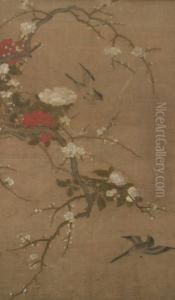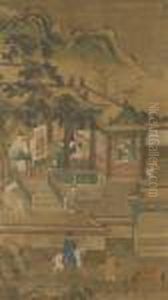Ren Renfa Paintings
Ren Renfa was a prominent figure in Chinese history, renowned for his dual talents in government and the arts. Born in 1255, during the tumultuous years of the Mongol conquest of China, Ren's life was marked by significant historical events that influenced his work and career. He lived through the transition from the Song Dynasty to the Yuan Dynasty, established by the Mongols. Despite the challenges of serving under foreign rule, Ren managed to rise to a high position in the Yuan Dynasty's bureaucracy, primarily due to his exceptional skills in water conservancy and administration. His expertise in these areas was critical in a period when managing water resources was essential for agriculture and sustaining the empire's economy.
Ren Renfa's legacy, however, is most enduring in the realm of Chinese painting. He was a master of the horse painting genre, bringing to life the equine subject with an unmatched realism and vitality. His ability to capture the spirit and form of horses was not merely a reflection of his personal interests but also an indication of his deep understanding of these animals, which were central to the military and economic foundations of the era. Ren's paintings often depicted horses in various poses and activities, from the tranquility of grazing to the intensity of battle, showcasing his meticulous attention to detail and profound grasp of equine anatomy.
Aside from horses, Ren Renfa also excelled in painting figures, landscapes, and flowers, demonstrating versatility across different genres of Chinese painting. His style combined the refined elegance of the Southern Song Dynasty with the bold innovations of the Yuan Dynasty, making his works highly prized by collectors and connoisseurs both in his time and in subsequent generations. Ren's contributions to Chinese art were not limited to his paintings; he also wrote about theory and technique, influencing artists long after his death in 1327.
Ren Renfa's career as an artist and official embodies the complex interplay between art, politics, and society in Yuan Dynasty China. His ability to navigate the political landscape of his time, while also achieving greatness in the arts, reflects the multifaceted nature of his talents and the enduring impact of his legacy on Chinese cultural history.



